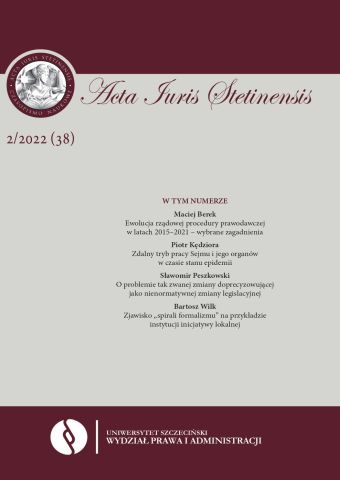Rola precedensu w porządku prawa stanowionego w Polsce – wprowadzenie do problematyki
The role of precedent in the order of statutory law in Poland
Author(s): Andrzej GrossSubject(s): Politics / Political Sciences, Law, Constitution, Jurisprudence, Law and Transitional Justice, Commercial Law
Published by: Wydawnictwo Naukowe Uniwersytetu Szczecińskiego
Keywords: a precedent in the Polish legal system; established jurisprudence; the role of judgments in Polish law
Summary/Abstract: Theoretically, precedence in the order of statutory law should not exist. It is an element of the Anglo-Saxon (common law) system, which in the continental system does not have an established tradition, has never been and never has become a custom. It is even a rule in the statutory law system that each judgment should be different from each other, it should be issued individually to a specific factual state, even a slight modification of which will result in a simultaneous modification of the judgment. And yet, for many years the courts have used the institution of established “line of jurisprudence” – not binding, if we are talking about a series of judgments of common courts, or binding – if we are talking about judgments of the Supreme Court. Almost all lawyers have been paying attention to the fact that the jurisprudence in Poland has been playing an increasingly important role in the resolution of new disputes for many years. Professors of law have been talking for years about the lack of any systematics in the application of the “established line of jurisprudence” by courts, including the Supreme Court, or even look for the so-called “Wrong precedent” – an almost pathological form. The passage of years – six and twelve years have passed since the publications indicated above – do not bring solutions, but often even greater chaos. The interpenetration of interpretations with law-making over time may lead to a serious increase in the importance of the judiciary in Poland, which may not receive strictly law-making prerogatives, but as an independent authority, expert in law and legal doctrine, but above all not related to the current political situation in its assessments. nor economic, it will not only uphold the law, but also actively participate in its creation using the law of precedent, which will then be reflected in the statutory law. It is important, however, that at that time the Polish judiciary should be as free as possible from its still-current problems: increasingly visible political aspirations for subordination of the judiciary to the executive, excessive burden on judges and court employees, and discrepancies in judgments, which should be supervised by an independent Supreme Court.
Journal: Acta Iuris Stetinensis
- Issue Year: 2022
- Issue No: 38 (2)
- Page Range: 109-121
- Page Count: 13
- Language: Polish

